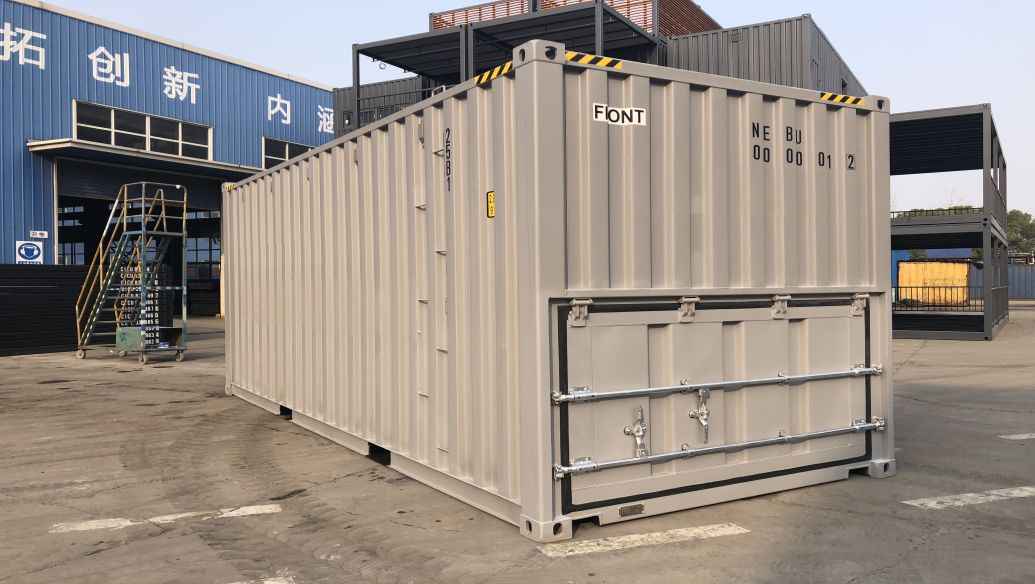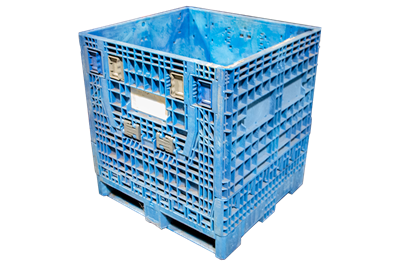The smart choice for businesses: used collapsible bulk containers for flexible storage
Why Mass Containers Are Essential for Sustainable and Economical Transport
Mass containers play a necessary role in modern logistics. They promote the efficient activity of big amounts of items, consequently enhancing transportation processes. This technique not just decreases expenses but additionally reduces environmental influence via lower discharges and waste generation. As markets seek more sustainable methods, the fostering of mass containers is coming to be significantly significant. What ramifications does this change hold for future logistics and supply chain monitoring?

The Advantages of Utilizing Bulk Containers in Logistics
Mass containers reinvent logistics by enhancing performance and sustainability. These containers permit the transportation of large quantities of items in a single journey, noticeably reducing the number of journeys required. This not just simplifies operations but likewise lessens labor prices connected with handling, filling, and dumping. On top of that, mass containers are designed to enhance space application within transport vehicles, making sure that more products can be shipped concurrently.
The standardization of mass containers additionally streamlines the logistics procedure. With consistent dimensions, they can be quickly piled and stored, bring about enhanced storage facility monitoring. In addition, bulk containers usually include sturdy materials that shield components from damages throughout transit, therefore decreasing product loss and increasing general integrity. As a result, companies can experience enhanced supply chain performance, eventually resulting in enhanced productivity and consumer fulfillment. This combination of variables makes mass containers a vital possession in contemporary logistics.
Environmental Effect: Minimizing Waste and Carbon Impact
As sectors significantly prioritize sustainability, the fostering of mass containers has actually become a crucial method for reducing waste and decreasing carbon footprints. These containers minimize the usage of packaging materials, such as boxes and plastic, therefore notably reducing total waste generation. By consolidating shipments, bulk containers improve transport performance, permitting for even more products to be transferred per trip. This reduction in journeys directly associates with lower greenhouse gas exhausts, adding to a smaller carbon impact.
In addition, bulk containers can commonly be recycled or recycled, better reducing ecological influence. The toughness of these containers guarantees they can hold up against numerous transportation cycles, minimizing the demand for single-use choices. used bulk containers. By streamlining logistics and promoting effective resource usage, bulk containers not just sustain lasting methods however additionally urge sectors to align with international environmental objectives. Inevitably, their execution shows a dedication to eco-friendly stewardship and accountable source administration
Price Savings: Just How Bulk Containers Lower Transportation Expenses
While lots of firms seek ways to enhance their bottom line, the usage of bulk containers provides a substantial possibility for decreasing transport expenditures. Mass containers make the most of the volume of items moved, enabling companies to ship bigger quantities at the same time. This performance minimizes the variety of journeys called for, directly lowering fuel prices and minimizing labor expenditures connected with loading and discharging.
In addition, bulk containers commonly feature structured layouts that maximize area usage within transport vehicles. This implies less empty areas, resulting in extra efficient use readily available capability. Additionally, the longevity of mass containers can decrease the risk of item damage throughout transportation, guaranteeing and decreasing losses that even more items arrive intact.
Enhancing Supply Chain Efficiency With Bulk Storage Space Solutions
Bulk storage space services play an important duty in improving supply chain efficiency by enhancing supply administration. By settling products into less, larger containers, companies can greatly decrease taking care of expenses connected with regular transfers and handling. This streamlined strategy enables better tracking and management of stock, eventually leading to enhanced functional performance.
Streamlined Inventory Monitoring
Efficient inventory monitoring is important for maximizing supply chain procedures, particularly when companies embrace bulk storage space options. These remedies enable businesses to preserve greater stock degrees while decreasing the regularity of replenishment. By settling products right into mass containers, firms can streamline their supply processes, minimizing the intricacy connected with tracking multiple smaller bundles. This approach promotes accurate inventory counts and improves forecasting precision, enabling even more informed decision-making. Furthermore, mass storage solutions simplify warehouse company, making it easier to situate and gain access to items when required. Consequently, organizations can achieve an extra efficient stock turn over rate, inevitably boosting general supply chain efficiency and decreasing the probability of stockouts or overstock circumstances.

Lowered Handling Costs
The implementation of bulk storage solutions not just streamlines supply management yet also substantially decreases dealing with expenses across the supply chain. By combining products right into mass containers, companies lessen the requirement for frequent handling and transfer between various storage space and transportation devices. This strategy minimizes labor prices linked with loading, discharging, and moving smaller packages. Furthermore, bulk storage reduces the regularity of deliveries, bring about reduced transportation prices and lowered fuel consumption. Consequently, companies can optimize their logistics procedures, enabling an extra reliable allowance of resources. Eventually, reduced taking care of prices add to enhanced overall supply chain performance, promoting an atmosphere that supports both sustainability and financial stability.

Flexibility of Mass Containers Across Numerous Industries
Although many industries have distinctive requirements for transportation and storage, bulk containers have actually become a versatile remedy that fulfills a large range of requirements. These containers, varying from large bins to specialized storage tanks, can suit varied materials, including powders, granules, and liquids. In the agricultural market, bulk containers assist in the transport of plant foods and grains, while the food and beverage market uses them for ingredients and completed items. The chemical market relies on bulk containers for safely transferring dangerous products, ensuring conformity with safety laws. Furthermore, construction companies take advantage of bulk containers for transporting aggregates and other materials. Their adaptability includes numerous settings of transportation, consisting of ships, trains, and vehicles, enhancing logistical efficiency. This convenience not just simplifies procedures across various fields but also promotes sustainability by lowering product packaging waste and enhancing area in transit. Therefore, bulk containers play a vital duty in modern-day supply chain monitoring.
Future Fads in Bulk Container Use and Sustainability
The future of bulk container use is progressively shaped by innovative materials development that boosts sustainability. Furthermore, automation in logistics promises to improve procedures, decreasing waste and improving performance. Welcoming round economic situation practices will certainly additionally revolutionize how bulk containers are developed, used, and reused, cultivating an extra lasting transport landscape.
Ingenious Products Advancement
As industries progressively prioritize sustainability, ingenious products development in mass containers arises as a significant factor in enhancing environment-friendly transport solutions. Scientists and suppliers are checking out naturally degradable plastics, recycled composites, and light-weight steels to reduce environmental influence. These products not just lessen waste but likewise improve fuel effectiveness by decreasing the overall weight of containers. In addition, developments in wise materials, which can adjust to varying conditions, boost the sturdiness and functionality of bulk containers. The assimilation of these cutting-edge materials lines up with round economic situation principles, promoting reuse and recycling. As the need for lasting practices expands, the development of such materials will play an important function in shaping the future of bulk container usage in logistics and transport.
Automation in Logistics
Considerable improvements in automation are positioned to change logistics and the application of mass containers, boosting sustainability in transportation. Automated systems, consisting of drones and independent vehicles, are simplifying the motion of bulk containers, decreasing the dependence on traditional fuel-powered transportation. These technologies optimize routing and loading processes, minimizing empty miles and enhancing fuel effectiveness. In addition, automated supply administration systems boost monitoring and tracking of mass containers, making certain much better source appropriation and minimized waste. The combination of the Web of Things (IoT) allows real-time data evaluation, allowing proactive decision-making that lines up with sustainability objectives. As automation remains to evolve, it is anticipated to drive additionally technologies wholesale container use, inevitably sustaining more lasting logistics techniques and lowering the ecological influence of transport.
Circular Economic Climate Practices
Innovations in automation are establishing the stage for a much more integrated method to circular economic situation practices in the domain of mass container usage. As industries increasingly embrace sustainability, mass containers are being designed for durability and reusability. This change not only reduces waste but likewise enhances resource performance. Companies are embracing methods such as closed-loop systems, where made use of containers are gathered, reconditioned, and reintroduced right into the supply chain. Furthermore, smart modern technologies track container life cycles, assisting in much better monitoring and lowering environmental effect. The cooperation between suppliers, logistics providers, and end-users is important in establishing criteria for sustainable container usage. used collapsible bulk containers. Future fads show a growing emphasis on materials that are eco-friendly and recyclable, more enhancing the circular economy's concepts in mass transport

Often Asked Concerns
What Materials Are Bulk Containers Generally Made From?
Bulk containers are usually constructed from resilient materials such as high-density polyethylene, steel, light weight aluminum, and cardboard. These materials offer defense, flexibility, and toughness, making them appropriate for delivering various products in various industries effectively.
How Do I Pick the Right Dimension Mass Container?
Choosing the right dimension bulk container entails assessing the volume of products to be delivered, thinking about managing devices compatibility, and appraising storage space demands. Proper size warranties effectiveness in transport and lessens waste throughout delivery.
Are Bulk Containers Reusable or Recyclable?
Mass containers are typically reusable, made for numerous journeys, boosting sustainability. Numerous can likewise be recycled, depending upon the materials utilized. Choosing recyclable options additionally lowers and sustains environmental goals waste in transportation methods.
What Security Rules Relate To Bulk Container Transportation?
Safety policies for mass container transport include compliance with the Division of Transport standards, proper labeling of harmful materials, architectural integrity analyses, and adherence to weight limitations to ensure safe handling and avoid crashes throughout transportation.
Just How Can Companies Change to Using Bulk Containers Efficiently?
Services can transform to bulk containers by evaluating current logistics, educating team on handling, purchasing appropriate tools, maximizing stock monitoring, and working together with vendors to guarantee compatibility and performance throughout the supply chain.
As sectors significantly focus on sustainability, the adoption of mass containers has emerged as a key method for decreasing waste and reducing carbon impacts. By settling products into bulk containers, firms can simplify their stock procedures, decreasing the complexity connected with tracking numerous smaller packages. As markets progressively focus on sustainability, ingenious products growth in bulk containers arises as a significant aspect in enhancing green transportation remedies. Automated systems, including drones and self-governing lorries, refurbished bulk containers are enhancing the movement of mass containers, reducing the reliance on standard fuel-powered transport. Additionally, automated stock administration systems boost tracking and monitoring of bulk containers, guaranteeing far better resource allowance and reduced waste.